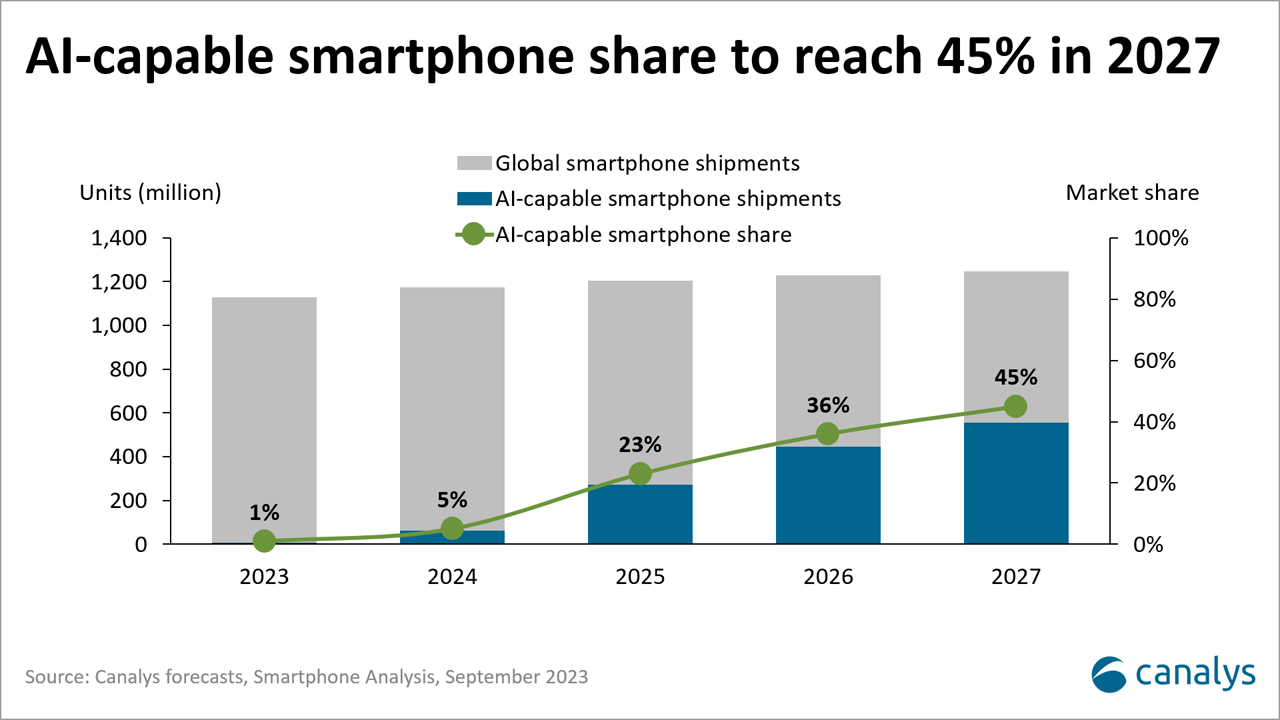Xiaomi’s first Wear OS smartwatch marks a change in strategic direction
11 January 2024
Canalys is part of Informa PLC
This site is operated by a business or businesses owned by Informa PLC and all copyright resides with them. Informa PLC’s registered office is 5 Howick Place, London SW1P 1WG. Registered in England and Wales. Number 8860726.

As Samsung takes the wraps off its new Galaxy S24 smartphones, the company reveals a clear vision for the future: generative AI is integral to its long-term product strategy, especially in the premium and flagship segments.

As Samsung takes the wraps off its new Galaxy S24 smartphones, the company reveals a clear vision for the future: generative AI is integral to its long-term product strategy, especially in the premium and flagship segments. Samsung’s premium and flagship models are now enhanced with advanced AI capabilities, signaling a significant shift in how the tech giant approaches innovation and market differentiation.
Time to market and global scale: setting the Galaxy S series apart
With mid-range devices increasingly mirroring flagship specifications, Samsung recognizes the importance of on-device AI features to distinguish its Galaxy S series. The 2024 integration of Google Cloud’s Gemini AI models into the Galaxy S24 is strategic, granting Samsung a time-to-market advantage over its Android rivals. This move is vital for the company to maintain global competitiveness.
The use of Google’s AI infrastructure, including Imagen 2, Gemini Pro and Nano LLM, empowers Android developers to rapidly deploy creative hybrid AI features and make them accessible to a worldwide audience. Furthermore, the seamless integration with various Google apps, such as Android Auto, and the potential future inclusion of Google Maps, underscores the symbiosis between Samsung and Google’s ecosystems.
Long-term differentiation: the double-edged sword
But Samsung’s reliance on Google’s AI infrastructure is a double-edged sword. While this partnership facilitates immediate gains, there is an inherent risk of commoditization. As Android OEMs gain similar access, Samsung may find its software differentiation diluted.
Moreover, the financial implications of using Google Cloud’s AI services loom on the horizon. Samsung’s current stance, as per its website, is to offer Galaxy AI features at no cost until the end of 2025 on supported devices. But the possibility of third-party AI features incurring charges remains a consideration for the future.
Implications for AI smartphones in the future
Canalys projects that by 2024, 5% of smartphones shipped will be AI-capable, rising to 45% by 2027. As the smartphone sector searches for new growth opportunities, integrating generative AI is becoming a strategic imperative for vendors, allowing for personalization and experience-driven innovation.
Notably, Chinese vendors are not lagging behind: they are propelling their AI strategies forward with product and OS releases launched in the past few months and scheduled for the first half of 2024.
The launch of the Samsung Galaxy S24 is a pivotal moment for Google. This partnership, if successful, positions Google to extend its influence to other Android manufacturers, potentially securing a dominant position in the AI solution provider space.
With the AI smartphone landscape rapidly evolving, the Samsung Galaxy S24 may not just be a product launch – it could very well be the harbinger of a new era for consumer devices, where AI is the cornerstone of innovation and user experience.